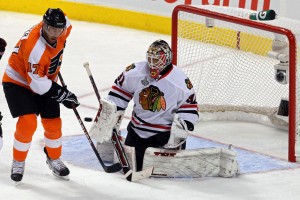In my most recent article, I expressed the belief that a trade for Jeff Carter could be the very move that could save the Blue Jackets’ franchise. On June 23rd, GM Scott Howson traded for the former Philadelphia Flyers sniper, offering in return Jakub Voracek and Columbus’ 1st and 3rd round picks in the 2011 NHL Entry Draft.
But without making an impact change to improve the Blue Jackets’ woeful blueline, acquiring Jeff Carter would have only made a slight modification to improve the team’s fortunes, something of which is not enough in the ever-brutal Western Conference.
On June 29th, the Blue Jackets made a second and possibly greater personnel move, trading a conditional draft pick – a 7th-round pick, conditional to a 5th round pick if the Blue Jackets are able to sign the Unrestricted Free Agent (UFA) – to the Montreal Canadiens for the rights to acquire arguably the most sought-after UFA defenseman, James Wisniewski.
But it was the signing of Carter and his visit, along with his agent, Bill Zito, to meet with Scott Howson that convinced Wisniewski that the Blue Jackets were a team who desperately wanted him and would allow him to be their featured, first-pairing defenseman.
Suddenly, the Blue Jackets’ prospects went from somewhat remote to becoming a serious playoff contender.
Wisniewski, who registered 51 total points which tied him for 5th in scoring amongst defensemen, instantly provides the Blue Jackets with their first legitimate offensive defenseman since Jaroslav Spacek, who played with the Blue Jackets during the 2003-2004 season. Wisniewski also provides the Blue Jackets with a defenseman who not only can man and ignite their previously moribund power play (PP) – the Blue Jackets finished 29th in the NHL with a woeful 14.0% conversion rate – but who provides a level of grittiness that has been in short supply for many a season.
With the additions of Wisniewski, who ranked 3rd amongst defensemen in the NHL in PP goals and 3rd in total PP points, and Carter, also considered a PP specialist, along with existing PP stalwarts in Rick Nash, Kristian Huselius and R.J. Umberger, suddenly form quite easily the NHL’s most-improved PP units. Given the 301 PP opportunities the Blue Jackets had last season, an improvement to the middle of the NHL pack can result in 12 more goals scored, an improvement that could result in an additional 8-10 more points and victories, in this area alone.
Add to that the addition of Carter, who scored 115 goals over his last three seasons in Philadelphia, and the Blue Jackets now have a sniper to take the scoring load off of elite forward Nash, who scored 105 goals over that same period of time. Having two legitimate scoring threats should also mitigate opposing NHL teams from clamping down on Nash, thus freeing up other Blue Jackets weapons to provide much-needed secondary scoring.
But the impact of these two signature moves extends far beyond their on-ice prospects. This sends a signal to the NHL that the Blue Jackets are to be taken seriously.
These moves also send a signal to their long-suffering fans that their concerns were finally being heard. As the Blue Jackets’ fortunes should improve, dramatically, having a bona fide playoff-contending team should bolster attendance figures and should mitigate mounting financial losses that have plagued the organization for the past two seasons.
To their credit, the Blue Jackets organization stuck to their promise of assessing and making changes to every aspect of the organization. Since majority owner John P. McConnell promised big changes, the Blue Jackets have made the following maneuvers:
- The Blue Jackets chose not to renew their directors of pro and amateur scouting, the latter of which was considered to be their greatest Achilles’ heel.
- They hired a full-time goaltending coach, Ian Clark, after years of hiring part-time goaltending consultants.
- They chose not to renew the contracts of all expiring and underperforming veteran players.
- They added former Minnesota Wild Head Coach Todd Richards as an assistant coach.
- They increased their overall team payroll to a competitive level of $58 million.
Off the ice, the Blue Jackets even replaced their previously highly-criticized Game Operations director. While this may not seem like much of an impact change to the on-ice product, this sends a symbolic gesture of goodwill that the fans concerns are genuinely listened to.
All of these on and off-ice changes have created a buzz around the city that is palpable. Ownership and management have realized the urgency to change the dynamic of the organization. Scott Howson has transformed from a risk-adverse executive to one who has made some extremely bold, but necessary, moves. The organization has emerged from being stuck in neutral to one that trying to foster a culture of winning and providing a legitimate product and brand.
While the date the puck drops is nearly three months away, for the Blue Jackets faithful, hope has now been replaced with anticipation.
